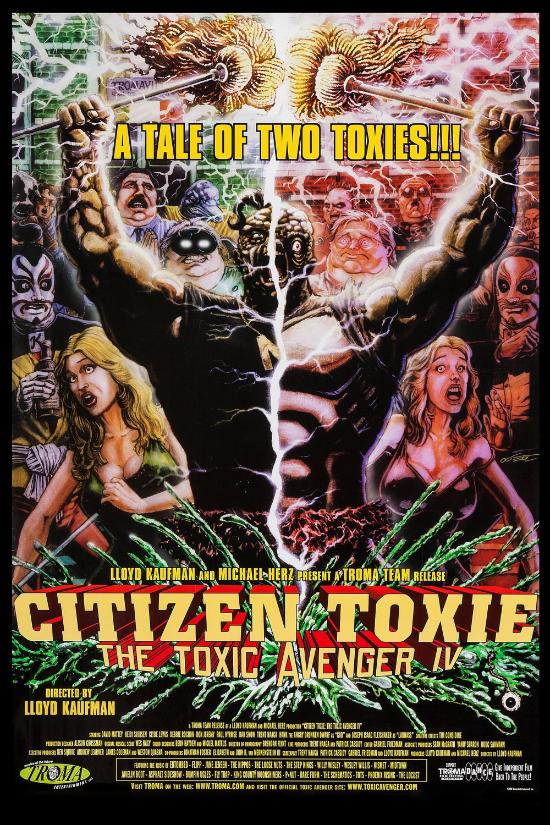Toxie punches down.
For a film that opens with a school for “special needs” being blown to pieces by flatulent terrorists, Citizen Toxie somehow still manages to find new lows. Troma has always thrived on bad taste, but this isn’t playful provocation or even pointed transgression – it’s spite masquerading as satire. Where the original Toxic Avenger skewered corrupt authority and societal hypocrisy, Citizen Toxie spends most of its runtime punching sideways and down, seemingly for the sheer thrill of it. There’s a meanness to its humour, a spiteful element that turns the would-be black humour a shitty brown colour.
Absent is the anarchic charm of Tromaville’s accidental mutant hero. In its place: a dimension-hopping plotline that swaps in a cackling alt-universe twin (Noxie) and a parade of shrieking caricatures, all in the name of bigger gore, louder noise, and maximum offence. The production values are the best they’ve ever been – the effects are grotesquely effective, the action moves at pace, and for once the story follows a reasonably straight line. But it all adds up to a spectacle so toxic it curdles on contact.
The film’s most sustained failure isn’t its excess, but its cruelty. The relentless, unapologetic use of the r-word doesn’t even bother with the fig leaf of satire – it’s gleeful, repeated, and plainly aimed at squeezing laughs from degradation. Previous entries flirted with chaos and obscenity, yes, but there was still a sense of absurdist inclusion. Disabled characters were bizarre, yes, but not dehumanised. Here, disability is reduced to a recurring punchbag, and the gags are vile. It’s not anarchic, it’s just bullying.
Sex and nudity, once gleefully subversive in the first film and increasingly autopiloted by Part III, now feel fully commodified – not to challenge norms, but to escalate the film’s sneering provocations. There’s a punitive quality to how the camera lingers, a kind of lecherous aggression that seems less about parodying sexualisation than indulging in it under the flimsy alibi of irony. There’s no commentary here – just salacious spectacle. And when the violence, sex, and jokes are all aimed downward, there’s nothing left to call it but reactionary.
David Mattey does what he can under the rubbery bulk of Toxie, and Clyde Lewis’ voice adds some threadbare continuity but while the addition of Noxie could’ve opened the door for a funhouse-mirror takedown of fascism and populist thuggery, any potential for sharp parody is buried under a landslide of bodily fluids, rape jokes, and masturbatory edgelord posturing. Cameos from Corey Feldman, Lemmy, Ron Jeremy, and others, including a slumming-it Stan Lee as the narrator add to the feeling of a circus spinning out of control, but none of them bring weight or wit – just more crass detritus in a film already drowning in it.
There’s potential in Tromaville’s alt-existence as Amortville, ruled by slogans and mobs. Noxie is a loud, lewd brute promising order through violence and it’s tempting to hope Kaufman is trying to draw a line between capitalism and creeping fascism, a nod to a culture where boardroom bullyboys inevitably turn to politics. But if Citizen Toxie has something to say, it loses its voice screaming about everything else first. By the time the commentary tries to emerge, the film has already disqualified itself from being part of the conversation.
Citizen Toxie markets itself as the true sequel to the original but what it actually represents is the moment the franchise stops parodying the culture of cruelty and starts participating in it. It’s faster, bloodier, and more technically competent than any of the sequels – and yet it’s also the least fun, the least pointed, and by far the most mean-spirited. There’s no underdog spirit left. Just a mop, a mask, and a franchise that’s turned on its own values.










